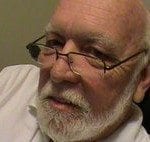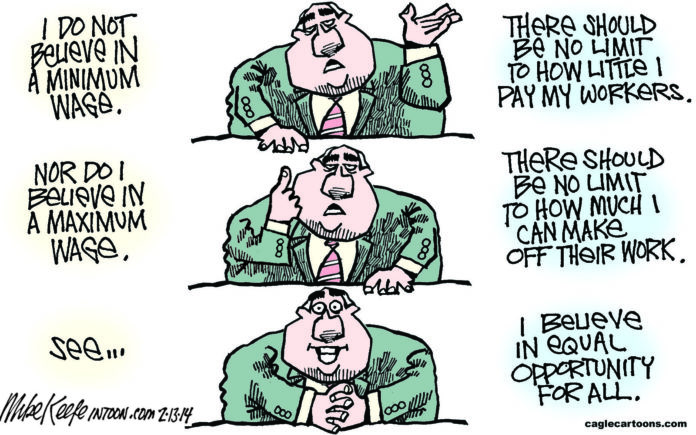BY RICHARD L. FRICKER
 May is graduation month, the start of festival season or when youth pack off out of country sojourning for a broader worldly perspective. May is also workers month, a celebration of those who tie together the slender threads of what we call civilization. May is a good time to celebrate U. Utah Phillips and his fellow travelers.
May is graduation month, the start of festival season or when youth pack off out of country sojourning for a broader worldly perspective. May is also workers month, a celebration of those who tie together the slender threads of what we call civilization. May is a good time to celebrate U. Utah Phillips and his fellow travelers.
Utah Phillips [May 15, 1935-May 23, 2008] was born Bruce Duncan Phillips in Cleveland, OH, to Edwin D. Phillips and Frances Kathleen Coates, both active labor organizers. Their activities and his stepfather’s management of vaudeville houses contributed to his becoming an icon of American folk music and the labor movement.
After an army tour in Korea during the mid-1950’s, Phillips rode the rails and joined the Industrial Workers of the World [IWW], the Wobblies. During these travels, he adopted the name U. Utah Phillips in deference to singer T. Texas Tyler.
It is ironic May 1st is the day of the worker in almost every corner of the industrialized world, except the United States. May 1st as Labor Day evolved from the 1886 Chicago Haymarket Massacre/Haymarket Affair.
Various unions and trades had set May 1st to enforce demands for an eight-hour work day. The worker standard was 60 hours during a six-day work week.
On May 3, McCormick Harvesting Machine Co. workers were confronted by 400 Chicago police and Pinkerton agents. At least two employees were killed in the melee.
On May 4, workers gathered at Haymarket Square. A bomb exploded. The police charged the workers. Labor activists reported four of their number dead.
At least six officers died, a reported 60 wounded. The Chicago Tribune quoted one officer, “A very large number of the police were wounded by each other’s revolvers.”
Seven activists were arrested, convicted and sentenced to death, four were hanged. Much like Oklahoma’s recent execution, they did not die immediately as expected. They slowly strangled to death in front of a horrified crowd.
In 1894, Congress officially designated “Labor Day.” This was after the Pullman Strike was broken at the cost of 30 workers dead at the hands of U.S. Marshals and the army. The actual day of celebration was moved from May 1 to the first Monday in September fearing a commemoration of the Haymarket Affair would ignite further civil disruption.
It was against this backdrop of the worker struggle that Phillips began to draw inspiration for his music and lyrics. At one point he returned to Utah where he met Ammon Hennacy of the Catholic Workers Party. He credited Hennacy with taking him off the rails and redirecting his life as a singer, writer, and labor organizer.
The founder of the Catholic Worker, Dorothy Day, referred to Hennacy as “Love in action,” according to Phillips.
Together they founded the mission and hospitality home named after labor activist Joe Hill. Phillips worked at the mission for eight years while writing and performing.
Hill was born Joel Emmanuel Hägglund [Oct. 7, 1879-Nov. 19, 1915] in Gävle, Sweden, immigrating to the U.S. after his parents died. After working on the docks and labor camps on the west coast he joined the IWW and rose in the ranks as an organizer. He wrote articles, songs and poetry for Wobblies publications under the name Joe Hill.
In 1913, Hill worked in the Silver King Mine in Park City, UT. On Jan. 10, 1910 a Salt Lake City grocer and son were killed during the robbery of their store. That same evening Hill appeared at the home of a local doctor with a gunshot wound. He claimed to have been shot during an altercation over the affections of a young lady.
Authorities claimed to have linked Hill to the robbery murder. He was tried, convicted and sentenced to death by firing squad. Later historians would undercover documents proving Hill was telling the truth. The prevailing thought at the time, and Hill wrote as much, he was killed more for being a Wobbly than for the murder.
Hill’s conviction and execution came during one of the most violent eras of the American labor movement. Earlier that year National Guardsmen accompanied by private police hired by Colorado Fuel and Iron Co. killed over two dozen workers, wives and children at a mining camp in Ludlow, CO.
Near the end, awaiting execution Hill wrote to fellow IWW organizer Bill Haywood asking friends to forego so far unsuccessful appeals saying, “Goodbye Bill. I die like a true blue rebel. Don’t waste any time in mourning. Organize … ”
At his execution officials in attendance reported that as the riflemen took up the order to “ready, aim” he shouted, “Fire – go on and fire!”
His ashes were divided into 600 packets which were sent to IWW chapters around the country, except Utah.
Among his songs, which have been sung by labor organizers, folk singers, immortalized in movie soundtracks, and covered by several modern artists were The Preacher and the Slave, The Tramp, There is Power in a Union, The Rebel Girl, and Casey Jones – the Union Scab. He also coined the phrase, “pie in the sky.”
Hill’s death did not end violence against the IWW and organized labor.
On Nov. 7, 1917, the Knights Of Liberty of the Ku Klux Klan, aided by local police, kidnapped 17 men, not all Wobblies. Then, in a remote wood they were flogged, tarred and feathered.
The 12 Wobblies were convicted of not owning war bonds, the five others had been defense witnesses. The incident is known as The Tulsa Outrage, foreshadowing the race riot of 1921.
Phillips chronicled these memories in his songs during the post war labor struggle. He considered himself a pacifist; some say he was more a Christian non-violent anarchist.
He would sing labor songs and then talk about the need for strong unions. He would talk and sing about his days as a Gandy dance, the backbreaking work of straightening the rails and resetting ties on the tracks.
He helped organize Wobbly groups even as his fame grew. He told David Kupfer, writing for the Progressive magazine, Pete Seeger “invented” the trade of going town to town, performing and urging citizen action. “Pete Seeger’s gift to my life is my life,” he said.
He knew Daniel Berrigan of the Berrigan Brothers, two Catholic priests who went to prison for their anti-war activities during the Vietnam era.
As to his increasing fame, he told the interviewer, “Dorothy Day once told me “Fame corrupts the health of the soul … I don’t need money, I need friends.”
His enduring legacy includes Wobbly tunes Hallelujah, I’m a Bum, The Preacher and the Slave, and Bread and Roses.
His first album was Good Though! which contained Daddy, What’s a Train?, Queen of the Rails, and the famous Moose Turd Pie.
His work has been recorded by Emmylou Harris, Ian Tyson, Tom Waits and just about every other artist who sings about and to the working class.
It is also a bitter irony that the workers struggle Phillips, his protégés and forebears immortalized has changed in ways they may not have imagined. But the worker movement, disorganized as it may be, continues.
Today what the workers of Haymarket, Ludlow and Pullman struck and died for – an eight-hour day – is still a quest. But it is a quest to be allowed to work an eight-hour day, to be a fully enfranchised employee respected for their work and their mind.
Oklahoma Gov. Mary Fallin, in league with her Tea Party Legislature, has made it illegal for workers to petition municipalities for a vote to raise minimum wage. Corporate CEO’s earning millions per year complain that to pay a worker what is acknowledged as a living wage would hinder the economy.
The IWW is still alive.
Yes, there is a lot more to be said about May than graduations, festivals and travel. In January 2008 Phillips announced he had elected to not have a needed heart transplant. He died May 23 from complications of heart disease. He was 73 years of age.
The worker struggle continues, and one can’t help but think somewhere on a picket line they can hear the echo of Utah Phillips singing Solidarity Forever [The Union Makes Us Strong].
– Richard L. Fricker lives in Tulsa, Oklahoma, and is a regular contributor to The Oklahoma Observer. His latest book, The Last Day of the War, is available at https://www.createspace.com/3804081 or at www.richardfricker.com.
Editor’s Note: The author wishes to dedicate this essay to Alpha M. Paine [1907-1996], Communications Workers of America Organizer and Steward.
From Richard L. Fricker: These are some of the songs and words of Utah Phillips. They are a part of American history that at times gets overlooked; they have been sung by millions of American workers on a thousand picket lines. I urge you to take a listen, know the history.
Utah Phillips talks about his life.
https://www.youtube.com/watch?v=gv4DJmcFTqE
“Solidarity Forever (The Union Makes Us Strong)”
https://www.youtube.com/watch?v=E7NPuK_QhEk
“There is Power In the Union”; written by Joe Hill
https://www.youtube.com/watch?v=O93YpTYCWRk
“I will Not Obey”
https://www.youtube.com/watch?v=h5Ro4rTvDcw
“Rock Salt and Nails” Not everything Utah Phillips wrote was about trains, labor, and unions. This is a haunting piece about a broken heart released by Steve Young in 1969.
https://www.youtube.com/watch?v=ZHNK56ITO9s
“Solidarity Forever” has been sung by thousands of artist this version is by Leonard Cohen.
https://www.youtube.com/watch?v=0jsQEwW4DVw








